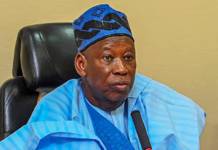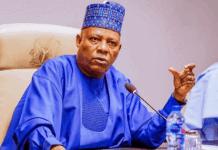NBS: Public Officials Took N721bn in Bribes in 2023
CHIGOZIE AMADI
Nigerian public officials received bribes to deliver services, amounting to as much as N721 billion or roughly $1.26 billion, latest survey from the National Bureau of Statistics (NBS) showed yesterday.
People in rural areas paid more than those in urban centres, according to a survey by the government-owned organisation.
Residents in Nigeria were forced to shell out the amount in cash bribes last year, the NBS said, corresponding to 0.35 per cent of Gross Domestic Product (GDP), the bureau said.
The frequency of bribery was, on average, higher in rural areas than in urban areas,” the statistics agency said in the report, published on its website.
In 2023, it stated that bribe-payers living in urban areas paid on average 4.5 bribes, while those living in rural areas paid on average 5.8 bribes.
“According to the 2023 survey, the average cash bribe paid was 8,284 Nigerian Naira. While the nominal average cash bribe size increased since 2019 (from NGN 5,754), this does not account for inflation.
“The inflation-adjusted average cash bribe in 2023 was actually 29 per cent smaller than in 2019 in terms of what could be bought with the money. Overall, it is estimated that a total of roughly NGN 721 billion or S$1.26 billion was paid in cash bribes to public officials in Nigeria in 2023, corresponding to 0.35 per cent of the entire GDP of Nigeria,” the report added.
The estimated number of bribes that exchanged hands declined to 87 million from 117 million in 2019, when the last survey was done. This appears to have been a result of reduced contact with public officials to 53 per cent from 63 per cent of the population.
Bribery was most rife among prosecutors, land registry officers, and customs and immigration officers, though Nigeria’s judges and magistrates received the largest kick-backs, the report said.
Even though each government pledges to fight corruption, public officials have developed a reputation for converting public funds for personal use while government workers frequently demand gratification before they can perform their functions, blooming said.
The nation ranks close to the bottom, 145 out of 180 countries, on Transparency International’s Corruption Perception Index.
A cost-of-living crisis, spawned by currency reforms and partial removal of a gasoline subsidy, emboldened 23 per cent of Nigerians to refuse paying a bribe when demanded, the NBS said.
Economic hardship, that has seen people loot warehouses and die in stampedes to get food, was ranked higher on a list of priorities for survey participants than corruption – which placed fourth – insecurity and unemployment.
Bribe payments in the private sector more than doubled in 2023, though public-sector corruption remained dominant in the West African nation.
The data, collected between October and November, showed that less than a third of Nigerians thought that the government was effective in fighting corruption, down from more than half in 2019 during the tenure of former president Muhammadu Buhari, who was first elected in 2015 on promises to end corruption.
“In 2023, around 56 per cent of Nigerians had at least one contact with a public official in the 12 months prior to the survey. This represents a reduction in the contact rate since 2019 (63 per cent), which was observed across most types of public officials and across zones.
“Contact with public officials remains higher in urban areas (61 per cent) compared with rural areas (52 per cent). In 2023, the largest share of Nigerian citizens had contact with health care professionals and public utilities officers, at 30 per cent and 24 per cent respectively. Police officers came third, with a contact rate of 20 per cent,” the report added.

























